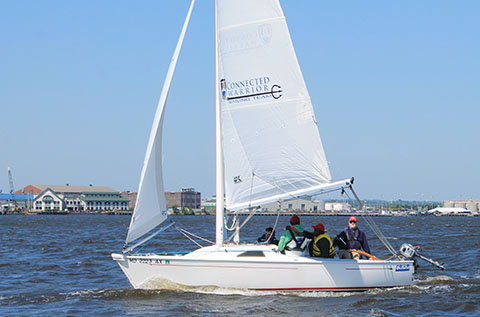Capital Gazette – Feb. 24, 2018
Jibe. Keel. Tiller.
If you know these terms, congratulations! According to the American Sailing Association, you understand a few key sailing terms. This Marylander, unfortunately, has a sailing vocabulary limited to regatta, schooner and SOS.
Thankfully, there are organizations in our great state that not only understand nautical terminology but are sharing their knowledge with a variety of under served communities.
Recently members of Chesapeake Region Accessible Boating, led by Executive Director Paul Bollinger, met with the Capital Gazette editorial board. It was a treat to hear the passion with which Mr. Bollinger and his colleagues described their love for boating and their commitment to bring it to those with physical and mental limitations.
As this is a community with strong military ties, it doesn’t hurt CRAB’s cause that it partners with the Wounded Warrior Project. Sailing with CRAB encompasses therapy and rehabilitation, teamwork and recreation. The organization caters to a wide population and plans to do more.
Miya Hunter-Willis: Let’s give our schoolchildren the safety they deserve
The nonprofit depends on private donations and grants. Mr. Bollinger made a compelling case for a facility to accommodate the needs of CRAB’s patrons, complete with floating docks and space to house donated boats. The organization’s desire to move to a marina on the south side of Back Creek is understandable. It was hard to resist thinking of ways to help CRAB realize its vision.
Anyone with an ounce of compassion and a cup full of decency would support this group. Former participant turned skipper Barry Considine shared his story about battling depression after polio left him paralyzed. His testimony was moving, as were his tales about giving back to the youth who attend CRAB-sponsored sailing camps. As he shared the story of a young girl who remained silent throughout the whole sailing experience until she asked to steer the boat, Mr. Considine choked up.
Our say: Promising project will have to navigate tricky waters
And isn’t that the point of philanthropy? To inspire those who are being served to pay it forward?
Let’s be honest: Sailing is a “gentleman’s sport,” a luxury pastime. Annapolis has one of America’s most robust sailing communities and, in some circles, is touted as the sailing capital of our country. The maritime charm of this port city has enticed sailors and nautical enthusiasts for centuries.
Nonetheless, sailing has been inaccessible to many populations for reasons that go beyond undersized parking spaces and a lack of handicapped-accessible docks.
To bridge the gap between accessibility and opportunity, one of CRAB’s programming initiatives focuses on summer sailing clinics for at-risk youth. Operations Manager Sarah Winchester partnered with the Annapolis City Police and the Anne Arundel County Police Department to host children who would otherwise have limited exposure to boating — an admirable objective, indeed.
Yet, questions remain about the best way to incorporate the needs of two disparate populations under one roof. While sailing is a noble activity, how does this sport offer at-risk youth the skills and opportunities they need in order to be successful? Two days participating in a team-building exercise is fun and exciting, but what happens afterward?
Any organization that provides services to youth understands the importance of consistency and follow-up. Is this program properly aligned with CRAB’s mission or is it a nice addition to an already well-established operation? Being disadvantaged economically isn’t synonymous with being at-risk for delinquency, a common stigma that haunts participants in well-meaning efforts like this one.
This organization has a unique opportunity to integrate its core objectives into a wider discussion about adaptive sailing as therapeutic recreation. Perhaps continuing to serve at-risk youth is a bit ambitious while CRAB continues to secure sufficient accommodations for its main constituency.
Chesapeake Region Accessible Boating provides a pathway for its participants to give back to others, while meeting the needs of nautical enthusiasts, both able-bodied and those with limitations. Let’s ensure that we continue to be a county where that is possible.
Severn resident Miya Hunter-Willis, a member of the Capital Gazette community editorial board, was an adjunct history professor at the Community College of Baltimore County and a member of New Life Fellowship International Ministries.

